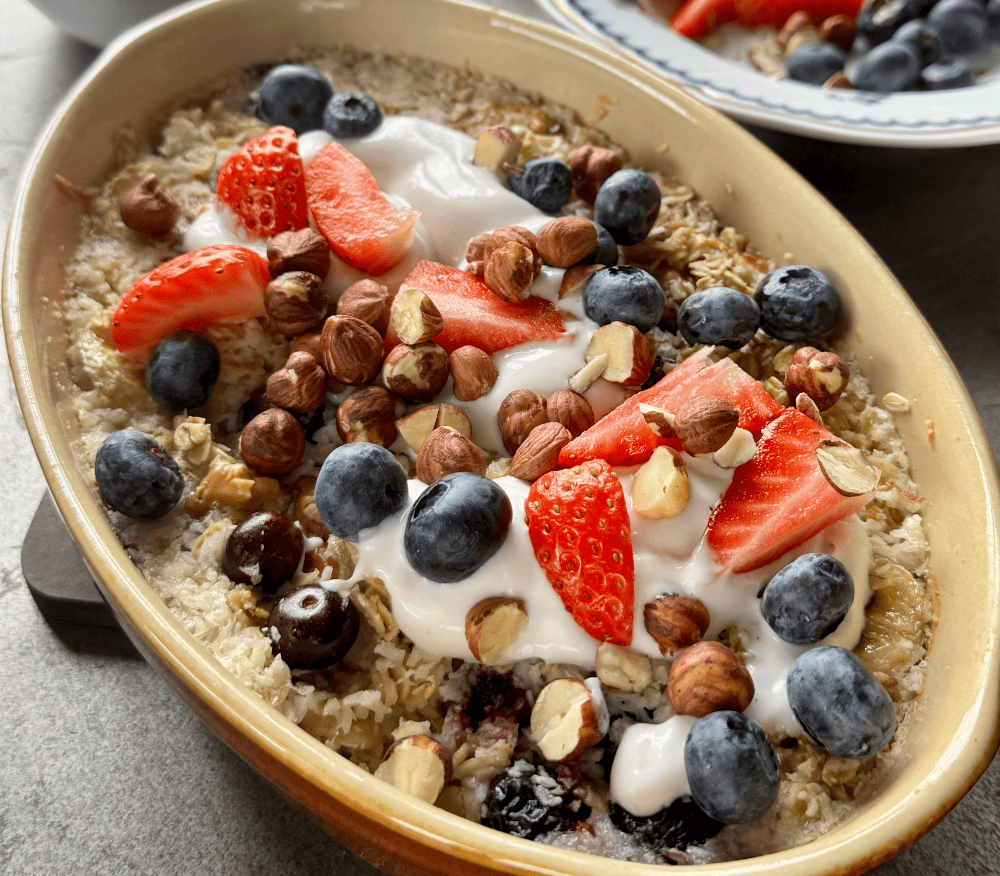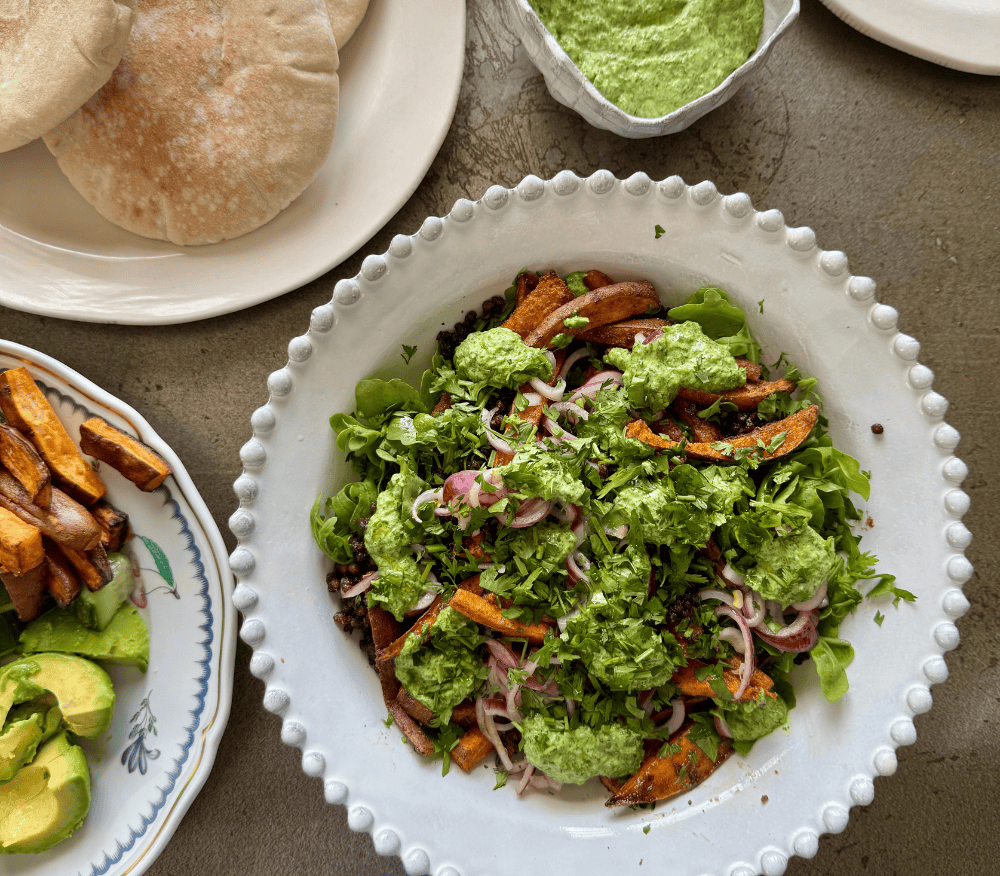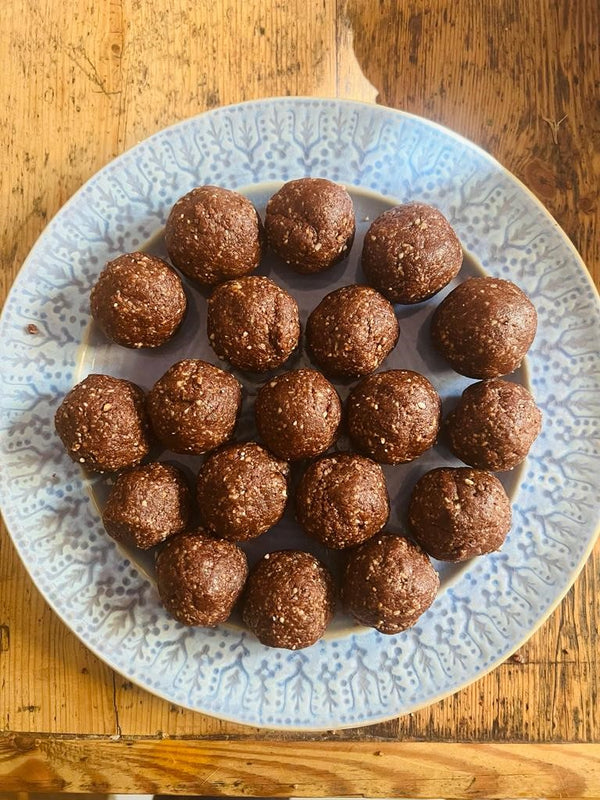October: Week Five
Welcome to our first recipe drop for October. Each recipe helps focus on supporting your immunity as Autumn starts to set in. For each recipe, we’ll include some info on how and why some of the ingredients are key for your immune health.
Remember that no one nutrient or food that will be a quick fix for your immune system. Your immune system needs a wide variety of nutrients from different foods to keep it functioning at its best.
Hit play on our relaxed cooking playlist
Day 1: Slow-Cooked Peanut Butter and Coconut Baked Oats
 How does it support my immune health?
How does it support my immune health?
Peanut butter is higher in healthy (unsaturated) fats than unhealthy (saturated) fats, mainly monounsaturated fats, including oleic acid. Oleic acid is thought to positively impact immune cells including specialist T cells, neutrophils, and macrophages. Peanut butter is also rich in protein containing around 8g per two tablespoons. Protein acts as building blocks for all immune cells and antibodies.
Oats are versatile wholegrains that support immune health in different ways. For example, they contain an abundance of nutrients including fibre (such as beta-glucans), copper, iron, selenium, zinc, as well as polyphenols such as ferulic acid and avenanthramides. Collectively, these can bolster defence against several infections, such as the common cold.
Day 2: Sweet Potato and Crispy Lentil Bowls with Coriander and Ginger Yoghurt
 How does it support my immune health?
How does it support my immune health?
The lentils in this dish are packed with fibre, containing an impressive 8g per half can. Specifically, lentils contain prebiotics – a type of fermentable fibre that acts as ‘food’ for your gut microbiome. In return, your gut microbes release health-promoting compounds into the gut, such as short chain fatty acids (SFCAs).
Sweet potatoes are a rich source of beta-carotene – the pigment that gives them their orange colour. Beta-carotene is converted to vitamin A. Vitamin A support the function of many types of immune cells including macrophages, T cells and B cells. Vitamin A also bolsters defence against several infections.
Day 3: Smoky Lentil and Tomato Soup
 How does it support my immune health?
How does it support my immune health?
Tomatoes and tomato products (e.g. tomato puree, tomato juice) are major sources of lycopene – a plant chemical found in highest amounts in the skin and acts as a powerful antioxidant. Lycopene can increase antibody production by specialist immune cells called B cells. Antibodies attach to harmful invaders - such as bacteria and viruses – and neutralise them.
Day 4: Oven-Baked Frittata With Peas, Puy Lentils and Broccoli
 How does it support my immune health?
How does it support my immune health?
Broccoli is part of the cruciferous veggie group which also includes cauliflower, cabbage, and kale. This group is an important one because it contains distinctive sulphur-containing plant chemicals, including glucosinolates. Glucosinolates are almost exclusively found in these veggie types and have been linked with anti-inflammatory and immune-strengthening effects. In fact, studies have shown a lower risk of gut-related cancers with increased consumption.
Blue cheese is rich in a compound called spermidine which is considered anti-inflammatory. It’s also thought to play a role in regulating immune function and harmful compounds (known as free radicals) that are known to damage cells.
Day 5: Smokey 3-Bean Chilli
 How does it support my immune health?
How does it support my immune health?
Beans (including red kidney beans and black beans) are rich in fibre – around 7g per half can. They contain highly fermentable fibres such as resistant starch and galacto-oligosaccharides (GOS). These fibres act as ‘food’ for your gut microbiome. In return, your gut microbes release health-promoting compounds into the gut, such as short chain fatty acids (SFCAs). What’s more, the coloured bean varieties generally contain more polyphenols than their white counterparts, including anthocyanins and proanthocyanidins.
Day 6: Crispy Tofu, Ginger and Oyster Mushroom Stir-Fry
How does it support my immune health?
Tofu is made from soybeans and is a good source of protein, vitamins A, C, D, E, K, and the B vitamins and minerals including calcium, phosphorus, potassium, magnesium, iron, zinc, manganese, selenium, and copper), as well as omega-3s.
All of these nutrients play a role in supporting the immune system. For example, Vitamin A support the function of many types of immune cells including macrophages, T cells and B cells. Vitamin A also bolsters defence against several infections.
On the other hand, vitamin C supports immune health by neutralising harmful compounds (known as free radicals) that are known to damage cells.
Day 7: Chocolate Pecan Brownie Balls
How does it support my immune health?
The main ingredient in these snacks are nuts and nut butters. Each nut has it’s own unique nutrient profile so I’d recommend mixing them up.
For example, cashews are particularly rich in zinc (and iron) compared with other tree nuts. Zinc is essential for helping immune cells to mature and develop. Zinc is also important in helping to prevent and fight off infections.
On the other hand, almonds contain higher levels of vitamin E which has potent anti-inflammatory effects. Vitamin E is well recognised for its role in immune function (especially specialist T cells) and helping to reduce the risk of infections.
Hungry for more? Dig into the next batch of gut-immune-supportive recipes
Discover more tips to help support your gut-immune connection.







